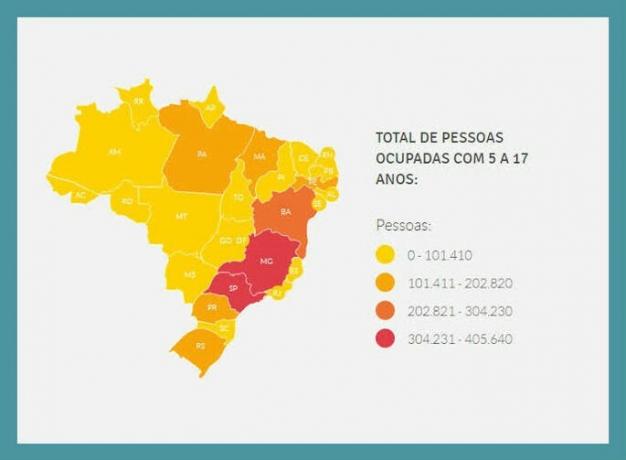THE social inequality it is, for sociology, a great object of study. Several sociological studies show that some of the most serious social phenomena, such as violence, may be related to the unequal relationships established between subjects. It is common to think that inequality is only related to people's economic condition. However, although it has a great impact on the individual's reality, the material condition is only one of the countless differentiations that have added social value and that can positively or negatively influence the reality of a subject. Attributes such as gender, age, religious belief or ethnicity can and are seen within an evaluative context, that is, they are seen as acceptable, desirable or repulsive characteristics. It is in this context that the concept of social stratification.
A simple way to understand what is the social stratification it is to see it as a set of inequalities that affect different subjects in a society, separating them in some way from the others. A group of people who belong to a poorer stratum of a society, for example, end up not having access to the same services made available to a person in a better economic condition. This is also seen even more clearly in the composition and organization of most large cities. Peripheral neighborhoods, or “peripheries”, where most of the poorest population are found, are usually located further away from the city centers.

The social pyramid exemplifies the hierarchy constituted in a society
In this sense, societies can be seen as built on a hierarchical pyramid: a favored minority is at the top and the less advantaged are closer to the bottom. Stratification, however, is not unique to our contemporary era. Inequality has been seen at different times in human history and follows different patterns of organization depending on the period and social conventions. These stratification systems are divided into four different types: slavery, caste, status, and class.
THE slavery it is an extreme form of inequality. In this system, some individuals become the property of others, being treated as objects, with no power of action or will other than that of their master. Although it has been formally eradicated, slavery still exists in certain parts of the world, including Brazil.
-
The system of castes it is mainly associated with Indian cultures that share the Hindu belief regarding reincarnation. This system is based on the belief that individuals are separated into different hierarchical levels determined from birth. Each caste has a fixed role to play, and those who are not faithful to the rituals and duties of their caste will be reborn in an inferior position in the next incarnation. Therefore, there is no mobility between the hierarchies of a caste, which even determines the type of contact that each individual can have with members of other castes.
Do not stop now... There's more after the advertising ;)
You estates they were the form of social organization of a great number of civilizations in the ancient world. The most famous of these was seen in the European feudal era. The feudal estates constituted strata with different obligations and rights, that is, they were divided into aristocrats and nobles, who occupied the highest position in the hierarchy, the clergy or religious authorities, who formed another estate devoted exclusively to religious activities, and the serfs, merchants and artisans, who made up the plebs. In this system, each estate had specific obligations: the nobles made war; the clergy took care of religious customs, and the serfs were responsible for producing necessary consumables.
The system of classes it has greater complexity and is very different from other types of stratification. Although there is no consensus among scholars on the subject, we can define, briefly, a social class as a great grouping of people who share similar material conditions, conditions that immensely influence the other aspects of Your lives. This means that the economic condition has a profound influence on the forms of class differentiation. Unlike other types of stratification, classes are not established through religious or inherited status. Individuals have a certain mobility in the social organization, being able to ascend or descend in the hierarchical structure. We call this movement social mobility, an important part of the dynamics of a society.
Two theorists stood out in the field of study of class theory: Karl Marx and Max Weber. They were based on the notion that a class is made up of a group of people who are similar in terms of ownership of the means of production. There would then be two distinct main social classes: the industrialists or capitalists and the proletariat. The first owns the means of production (industries, factories, manufactures), and the second only has its own labor force to earn a living.
Weber, however, despite thinking like Karl Marx in relation to the influence of material reality in the formation of our society, believed that there would be more factors, in addition to the material condition of the individual, that would influence the construction Social. For Weber, purely materialist theories were insufficient to understand the complexity of social relations between classes. Dimensions of social life, such as social inequality, were not limited to the material condition of each individual. It was necessary to observe, therefore, the other variables that would affect the construction of the social subject, such as the status social, which is defined in the relation of differences between social groups and according to the social prestige conferred by the too much. This status relationship, for example, goes beyond economic separations, being determined based on a person's direct knowledge of interactions in different contexts. This confers a certain power of action to the individual, in addition to that determined by his material possessions.
by Lucas Oliveira
Graduated in Sociology
Would you like to reference this text in a school or academic work? Look:
RODRIGUES, Lucas de Oliveira. "Social Stratification and Inequality"; Brazil School. Available in: https://brasilescola.uol.com.br/sociologia/estratificacao-desigualdade-social.htm. Accessed on June 27, 2021.


